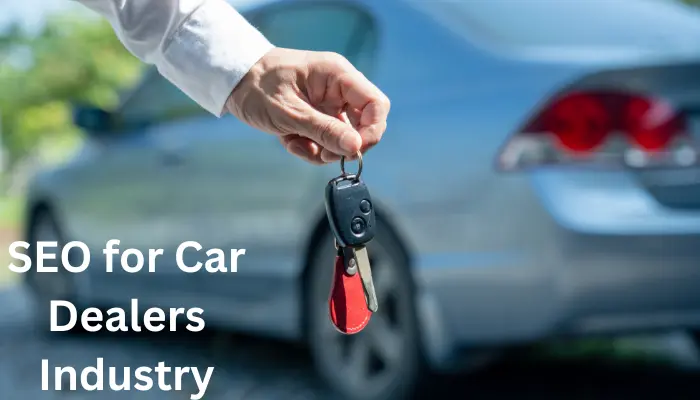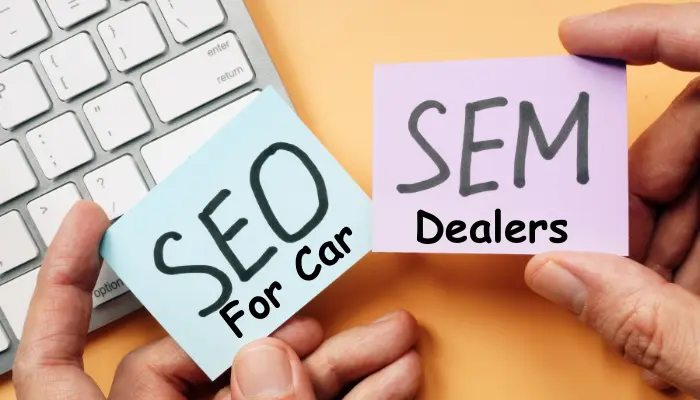Local SEO Services Near Me | Local Pro1 Welcome to...
Fueling Growth: SEO for Car Dealers
Fueling Growth| SEO for Car Dealers
SEO for car dealers, or Search Engine Optimization for car dealerships, is a digital marketing strategy aimed at improving the online visibility and search engine rankings of automotive businesses that sell cars, provide automotive services, or offer related products. In today’s digital age, the majority of potential car buyers and automotive enthusiasts turn to the internet to research and find information about vehicles, dealerships, and services. SEO for car dealers plays a crucial role in ensuring that these businesses can be found easily by their target audience when they search for relevant keywords and phrases on search engines like Google, Bing, or Yahoo. LocalPro1 will provide the best services related to the SEO for car dealers.

Local SEO for Car Dealers
Importance of Local SEO for Car Dealers:
- Local SEO helps car dealerships target potential customers in their immediate geographic area.
- It boosts online visibility, making it easier for local customers to find your dealership.
- Enhances credibility and trust among local consumers.
- Drives more foot traffic to your physical dealership.
- Increases sales and revenue through local online and offline channels.
Google My Business Optimization:
- Claim and verify your Google My Business (GMB) listing.
- Ensure NAP (Name, Address, Phone number) consistency across all online platforms.
- Add accurate business information, including hours of operation, website URL, and high-quality images.
- Encourage customer reviews on GMB and respond to them promptly.
- Use GMB posts to share updates, promotions, and events.
Local Keyword Research:
Identifying Local Keywords:
- Use keyword research tools like Google Keyword Planner or SEMrush to find relevant keywords.
- Consider localized long-tail keywords that include your city or region.
Long-tail Keywords for Car Dealerships:
- Long-tail keywords often have less competition and can attract highly targeted local traffic.
On-Page SEO for Local Search:
Optimizing Website Content:
- Create location-specific landing pages for different neighborhoods or cities you serve.
- Include local keywords naturally in title tags, meta descriptions, headers, and content.
- Optimize images with alt text containing local keywords.
- Ensure mobile-friendliness and fast page loading speeds.
- Publish high-quality, informative, and engaging content that resonates with your local audience.
Schema Markup for Local SEO:
- Implement structured data markup (schema.org) to provide search engines with detailed information about your dealership.
- Include business information, customer reviews, ratings, operating hours, and location data.
- Schema markup can enhance your search results with rich snippets, making your listings more appealing to users.
Off-Page Strategies:
Building Local Citations:
- List your dealership on local business directories, chamber of commerce websites, and industry-specific directories.
- Ensure consistency in NAP information across all citations.
- Monitor and update citations regularly.
Customer Reviews and Ratings:
- Encourage satisfied customers to leave reviews on Google, Yelp, and other relevant platforms.
- Respond to both positive and negative reviews professionally.
- High ratings and positive reviews can boost your local search rankings.
Monitoring and Analytics:
Tracking Local SEO Performance:
- Use Google Analytics and Google Search Console to monitor website traffic and performance.
- Monitor keyword rankings using SEO tools.
- Track GMB insights for visibility, engagement, and customer actions.
Adjusting Strategies for Local Markets:
- Regularly analyze the effectiveness of your local SEO efforts.
- Make data-driven adjustments to your strategies, such as refining keywords, improving on-page SEO, and adjusting content.
- Stay updated on Google algorithm changes and adapt accordingly.
SEO for Car Dealers Industry

Competition Analysis:
- Identify key competitors in your local area and online.
- Analyze their website structure, content, and backlink profiles.
- Determine their target keywords and strategies.
- Use tools like SEMrush, Ahrefs, or Moz to gather competitive data.
Seasonal Trends in the Car Industry:
- Research and anticipate seasonal trends in the car industry (e.g., new model releases, holiday promotions, tax return season).
- Adjust your content and advertising strategies to capitalize on these trends.
- Create specific landing pages or blog posts for seasonal promotions.
Content Marketing for Car Dealers:
Creating Engaging Automotive Content:
- Produce high-quality, informative, and visually appealing content such as blog posts, videos, infographics, and buyer’s guides.
- Address common customer questions and pain points.
- Optimize content for relevant keywords and local SEO.
- Use engaging visuals and multimedia to enhance user experience.
Leveraging Car Reviews and Comparisons:
- Publish detailed car reviews and comparisons, highlighting the strengths of the models you sell.
- Encourage satisfied customers to leave reviews.
- Monitor and respond to reviews on platforms like Google My Business and Yelp.
Technical SEO for Car Dealers:
Site Speed and Mobile Optimization:
- Optimize your website for mobile devices.
- Compress images and use browser caching to improve site speed.
- Ensure a clean and responsive design for mobile users.
Structured Data for Car Listings:
- Implement structured data markup (e.g., schema.org) to provide search engines with structured information about your car listings.
- Include details like make, model, year, price, mileage, and VIN.
Backlink Building Strategies:
Quality Backlinks for Automotive Websites:
- Seek backlinks from reputable automotive websites, industry blogs, and local directories.
- Create shareable and link-worthy content that naturally attracts backlinks.
- Avoid spammy or low-quality link-building practices.
Outreach and Guest Posting in the Car Industry:
- Collaborate with industry influencers and bloggers for guest posting opportunities.
- Use personalized outreach emails to pitch guest posts or partnerships.
- Build relationships with other players in the car industry.
SEO Tools and Resources:
Must-Have Tools for Car Dealers:
- Use SEO tools like Google Analytics, Google Search Console, SEMrush, Ahrefs, and Yoast SEO for WordPress to monitor and optimize your SEO efforts.
Staying Updated with Industry Changes:
- Stay informed about SEO trends and changes by following industry blogs, attending webinars, and participating in SEO forums.
- Adapt your strategies as search engine algorithms evolve.
SEM and SEO for Car Dealers

Paid vs. Organic Search:
- SEM (Search Engine Marketing) services involves paid advertising on search engines. Car dealers can create and run ads that appear at the top of search engine results pages (SERPs) when specific keywords are used.
- SEO (Search Engine Optimization) focuses on optimizing a car dealer’s website and online presence to improve organic search rankings. This means that the website appears higher in the SERPs naturally, without paying for placement.
Combining SEM and SEO Strategies:
- SEM and SEO can work together to maximize online visibility. While SEM provides immediate results through paid ads, SEO is a long-term strategy that improves organic rankings over time.
- Combining both strategies ensures a more comprehensive online presence, capturing both users searching for immediate solutions (SEM) and those looking for long-term information (SEO).
Benefits of SEM for Car Dealers:
Instant Visibility:
- SEM allows car dealers to instantly appear at the top of search results for specific keywords, increasing visibility and attracting potential customers immediately.
- This is crucial for promoting limited-time offers, promotions, or special events.
Targeted Advertising:
- SEM allows car dealers to target specific demographics, locations, and search queries. This precision ensures that the ads are shown to a relevant and potentially interested audience.
- Car dealers can use SEM to target users based on factors like location, device, and browsing behavior.
Integrating SEM and SEO:
Keyword Synergy:
- Car dealers should conduct keyword research to identify relevant keywords for both SEM and SEO efforts.
- Using the same or similar keywords in both strategies can help create synergy and reinforce the car dealer’s online presence.
Coordinated Content and Ad Campaigns:
- Align the content created for SEO (blog posts, articles, landing pages) with the keywords and messaging used in SEM campaigns.
- Ensure that the landing pages for SEM ads are optimized for SEO to improve long-term organic rankings.
Measuring SEM and SEO Success:
Key Metrics for SEM:
Click-through Rate (CTR): The percentage of users who click on your SEM ads.
Cost Per Click (CPC): The average cost for each click on your ads.
Conversion Rate: The percentage of users who complete a desired action, such as making a phone call or submitting a lead form.
Ad Position: Where your ads appear on the SERPs.
Key Metrics for SEO:
Organic Traffic: The number of visitors coming to your website through organic search results.
Keyword Rankings: Monitoring the position of your website for target keywords.
Bounce Rate: The percentage of users who leave your site without interacting with it.
Domain Authority: A measure of your website’s overall authority and trustworthiness in the eyes of search engines.
Budgeting and ROI:
Allocating Resources for SEM and SEO:
- Allocate budget based on the specific goals and strategies for SEM and SEO. SEM will require ongoing ad spend, while SEO may involve initial setup costs and ongoing maintenance.
- Consider the competitiveness of keywords in the automotive industry when allocating resources.
Calculating ROI in the Automotive Industry:
- Measure the return on investment by tracking the number of leads or sales generated from SEM and SEO efforts.
- Compare the revenue generated from these efforts to the costs (ad spend, SEO services) to calculate ROI.
- Keep in mind that the automotive industry often has a longer sales cycle, so ROI analysis may require a longer-term perspective.
Conclusion
Implementing effective SEO strategies for car dealerships is imperative in today’s digital age. With the majority of potential buyers turning to search engines when looking for their next vehicle, optimizing your online presence is not just a choice but a necessity. By focusing on keyword research, on-page optimization, local SEO, and high-quality content creation, car dealers can enhance their visibility in search engine results pages, attract more qualified leads, and ultimately boost sales. Feel free to contact us for any type of query or the services related to the SEO for car dealers.
FAQs
What Is Seo For Car Dealers?
SEO, or Search Engine Optimization, for car dealers involves strategies and techniques to improve the online visibility of a car dealership’s website. The goal is to enhance its ranking on search engine results pages, making it easier for potential customers to find the dealership when searching for relevant keywords.
Why Is Seo Important For Car Dealers?
SEO is crucial for car dealers because it helps increase online visibility, drive organic traffic, and generate leads. By optimising the website and content for search engines, car dealers can reach a broader audience and stay competitive in the digital landscape.
What Are The Key Components Of Seo For Car Dealers?
Important components of SEO for car dealers include keyword optimization, local SEO, website structure, quality content creation, backlink building, and mobile optimization. These elements collectively contribute to higher search engine rankings.
How Can I Optimise My Car Dealership Website For Local Seo?
Local SEO involves optimising your website for location-specific searches. Ensure your business information is accurate and consistent across online directories, create a Google My Business profile, and incorporate location-based keywords in your website content.
What Role Do Keywords Play In Seo For Car Dealers?
Keywords are crucial in SEO for car dealers as they help search engines understand the relevance of your content. Identify and use relevant keywords related to your car dealership, models, and services to improve your website’s chances of ranking higher in search results.
Our Services
Our Latest Posts
PPC White Label Services by Local Pro1 | Expert Solutions
PPC White Label Services by Local Pro1 | Expert Solutions...



